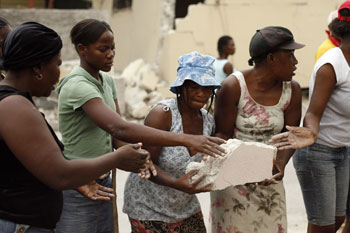imperialists fail to meet needs
 |
| Reuters/Ho New |
| Haitian women clear rubble in Port-au-Prince January 25. Working people are organizing themselves in the face of the social disaster following recent earthquake. |
BY CINDY JAQUITH
January 27—After a 7-magnitude earthquake devastated their country January 12, examples of Haitian working people organizing to collectively distribute scarce food, set up shelters, and provide security are now being reported. Their actions are taken as Washington and other imperialist powers, as well as the government in Haiti, fail to provide adequate and timely relief.
Although the United Nations estimates that 2 million Haitians require rapid food aid, the UN World Food Program as of January 23 had distributed food to a mere 320,000. New York Times correspondent Damien Cave visited the devastated working-class city of Carrefour just outside Port-au-Prince. There he found “small soup kitchens have sprung up with discounted meals, subsidized by Haitians with a little extra money.”
Cave interviewed three women who said they began cooking for neighbors the day after the earthquake struck and typically serve 100 people before 10:00 a.m. “Smiling and proud, the women said they did not have the luxury of waiting for aid groups in their hilly neighborhood.”
Four thousand homeless people in the Primatur Gardens camp in the capital are surviving under plastic tarps, umbrellas, or just tree shade. They have set up a committee to run the camp, reported the Christian Science Monitor. The committee organizes residents with health-care training to provide rudimentary treatment, maintains a census of who is living there, mobilizes people for regular cleanup, and conducts security patrols.
Joel Jean-Baptiste told the Monitor that the camp is on state property, “but once there was a disaster and the government vanished, it became the right of the people to occupy this property and use it.” Camp resident Magda Jeidy said, “If we waited for our government we’d all die.”
Since the earthquake Haitian President Rene Preval has yet to deliver a national address to the Haitian people. He remains at a temporary government office at a police station in the affluent suburb of Petionville outside the capital. He has not ventured out to visit any camps or hospitals. The Financial Times explained that “Today, every last function of government—from running hospitals to restoring water supplies and handing out food—is in effect in the hands of foreigners.”
Stories continue to surface of the callous indifference the international rescue effort, spearheaded by Washington, has shown to the working-class areas most damaged by the earthquake. When the Haitian government called a halt to the search for survivors in collapsed buildings on January 23, a stunningly low 132 people had been pulled out alive by international teams, many of them foreign diplomatic personnel. In contrast, working people using whatever was at hand have likely saved thousands in impoverished neighborhoods where the international teams never went.
Both Haitian prime minister Jean-Max Bellerive and communications minister Marie-Laurence Jocelyn Lassegue said their estimate of the number dead was 150,000. But no systematic count was done and thousands of corpses were simply hauled away in dump trucks to be buried in mass graves, with no attempt to identify the victims.
No one knows how many of those who perished would have lived if search missions, food, water, and doctors had arrived sooner. In an op-ed piece in the January 25 Wall Street Journal, three U.S. surgeons who went to Haiti described waiting four days for the U.S. military to permit them to land in Port-au-Prince. They then confronted a mass of patients requiring blood and medicines to fight infection, but said they “received virtually no support from any branch of the U.S. government, including the State Department.”
Cuban medical mission a contrast
Standing in sharp contrast is the way the revolutionary government of Cuba has responded to the social disaster. According to the Cuban newspaper Escambray, Cuban medical personnel, now numbering 700 people, had treated more than 25,000 injured Haitians as of January 26. When the earthquake struck there were already hundreds of Cuban medical volunteers in Haiti as part of a long-term aid program that Cuba’s government has provided for the last 11 years. They in turn have mobilized Haitian medical students and volunteers from other countries to help staff field hospitals and clinics.
The young manager of one Cuban clinic, Junior Enrique López, told National Public Radio that a plane of Cuban doctors arrived the day after the earthquake and two flights have arrived with food, medicine, and other supplies every day since.
In the midst of the crisis, 19 foreign ministers of major capitalist countries and representatives of international aid organizations met January 25 in Montreal to map out a response to the situation in Haiti. Despite the obvious immediate steps needed—from massive aid with no strings attached, to opening the doors of imperialist countries to refugees, to canceling Haiti’s foreign debt—the meeting took no action, except for a call by U.S. secretary of state Hillary Clinton for another meeting at the United Nations in March.
Haitians to be held at Guantánamo
Washington is meanwhile readying the infamous prison camp at its naval base in Guantánamo Bay, Cuba, for as many as 12,000 Haitians it expects to capture when they try to enter the United States without visas.
The Department of Homeland Security says about 200 severely injured orphans from the Haiti disaster will be allowed to enter the United States on a “humanitarian parole.” Children already cleared for adoption prior to the earthquake can also enter. But according to the Washington Post, the U.S. embassy in Haiti turned down a Miami doctor trying to get visas for three badly burned children.
Prior to the earthquake, some 55,000 Haitians had their requests for U.S. visas approved, but they remain on a waiting list that could take years. The U.S. Congress limits immigration from Haiti to 25,000 people annually.
No comments:
Post a Comment
Comments